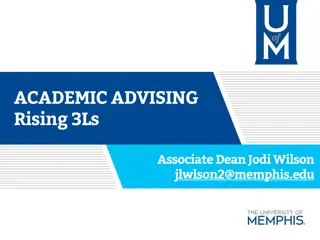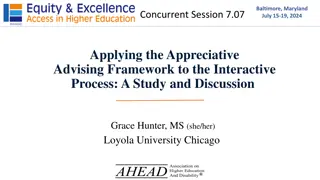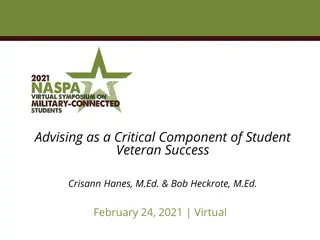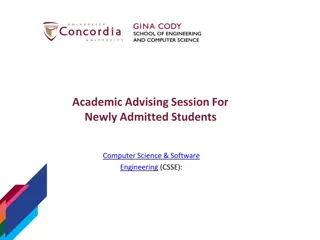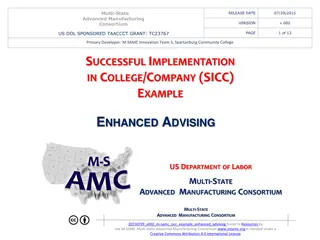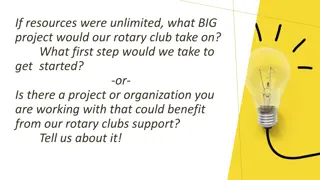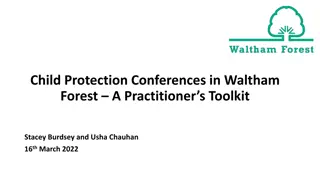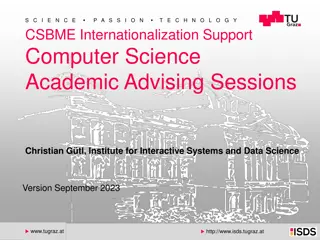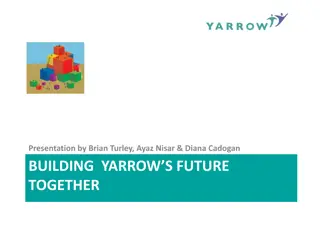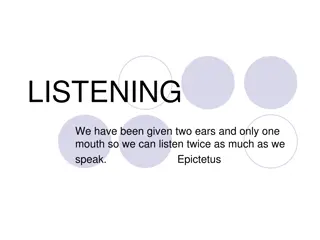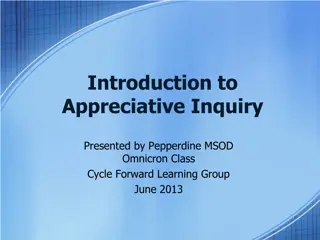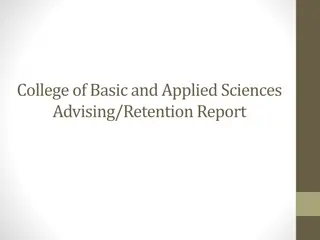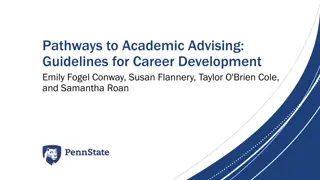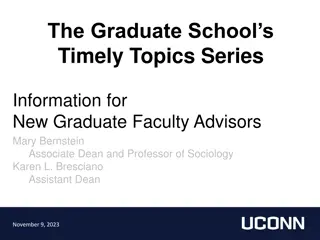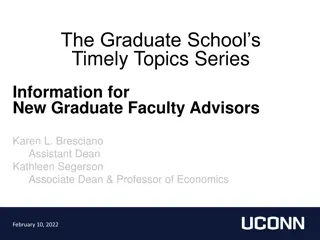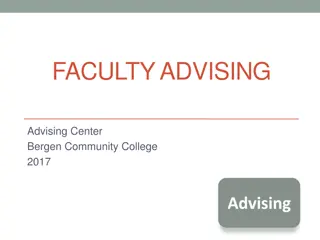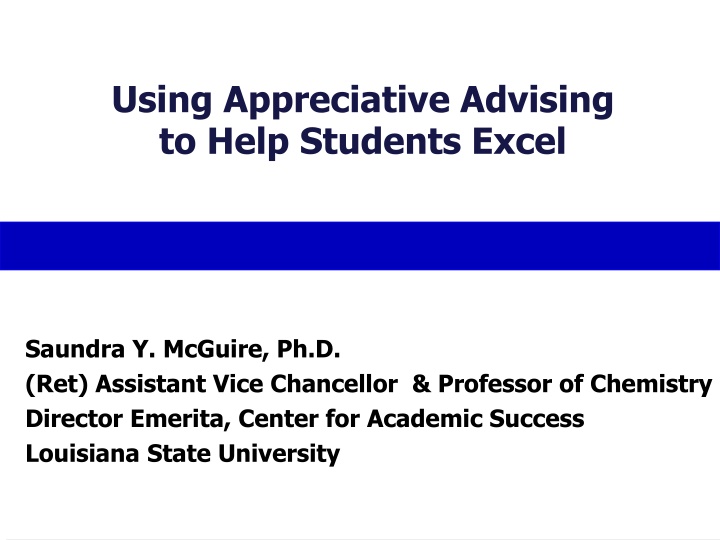
Assist Students Excelling Through Appreciative Advising Insights
Discover effective strategies for advising students to excel, understand the mindset of different generations, and learn what works and what doesn't when advising Gen Y & Z students. Reflect on characteristics of productive advising sessions and more.
Uploaded on | 3 Views
Download Presentation

Please find below an Image/Link to download the presentation.
The content on the website is provided AS IS for your information and personal use only. It may not be sold, licensed, or shared on other websites without obtaining consent from the author. If you encounter any issues during the download, it is possible that the publisher has removed the file from their server.
You are allowed to download the files provided on this website for personal or commercial use, subject to the condition that they are used lawfully. All files are the property of their respective owners.
The content on the website is provided AS IS for your information and personal use only. It may not be sold, licensed, or shared on other websites without obtaining consent from the author.
E N D
Presentation Transcript
Using Appreciative Advising to Help Students Excel Saundra Y. McGuire, Ph.D. (Ret) Assistant Vice Chancellor & Professor of Chemistry Director Emerita, Center for Academic Success Louisiana State University
Desired outcomes We will understand why many students don t want to take advice We will view our students differently We will have concrete strategies that work when advising students We will understand the role of metacognition in effective advising We will spend time reflecting on improving our advising More of our advisees will heed our advice!
Overview Characteristics of many of today s students An advising model that works The role of metacognition in advising Importance of Student Mindset Wrap Up
Reflection Questions What are the characteristics of a productive advising session vs an unproductive one? What are the characteristics of an effective advisor? What are the characteristics of a receptive advisee?
The Generations: 1925 - today Name Year Born 1925 1944 The Silent Generation Baby Boomers 1945 1965 Generation X 1966 1978 Generation Y 1979 1995 Generation Z (Digital Natives) 1996 - present *Taylor, Mark. 2005.
Characteristics of Many Gen Y and Z Students Have consumer orientation Convey sense of entitlement Seek instant gratification Poor long term planning and problem solving skills Expect to be thought of as excellent Cynical and skeptical of authority *Taylor, Mark. 2005.
What does NOT work when advising most Gen Y & Z s Telling them they are not prepared Expecting them to trust the advisor Expecting that they will know the catalog Telling them there is a fixed path Advising them to change plans
What DOES work when advising most Gen Y & Z s Beginning with their strengths Engaging them in the planning process Showing them how to access information Encouraging them to plot their own path Helping them change strategies, but not necessarily paths Encouraging them!
Appreciative Advising An Advising Model that Works for Contemporary Students Developed by Jennifer Bloom, Ph.D.
The Six Phases of Appreciative Advising Don t Settle Disarm Discover r Deliver Design Dream Bloom, J. L., Hutson, B. L., & He, Y. (i2008)The appreciative advising revolution. Champaign, IL: Stipes Publishing.
Description of the Phases of Appreciative Advising* Disarm Discover Dream Design Deliver Don t Settle diffuse defensiveness delve into strengths imagine possibilities develop a plan implement strategies aim for 100% mastery! *Bloom, J. L., Huston, B. L., & He, Ye., 2008,The Appreciative Advising Revolution. Champaign, IL: Stipes Publishing.
Metacognition*: Crucial Strategy for the Design, Deliver, and Don t Settle Phases Thinking about thinking Being consciously aware of yourself as a problem solver Planning, monitoring, and controlling your mental processing Accurately assessing your level of learning *Flavell, 1979
This pyramid depicts the different levels of thinking we use when learning. Notice how each level builds on the foundation that precedes it. It is required that we learn the lower levels before we can effectively use the skills above. Bloom s Taxonomy Creating Putting elements together to form a coherent or functional whole; reorganizing elements into a new pattern or structure through generating, planning, or producing. Making judgments based on criteria and standards through checking and critiquing. Evaluating Breaking material into constituent parts, determining how the parts relate to one another and to an overall structure . Analyzing Carrying out or using a procedure through executing, or implementing. Applying Constructing meaning from oral, written, and graphic messages through interpreting, exemplifying, classifying, summarizing, inferring, comparing, and explaining. Understanding Retrieving, recognizing, and recalling relevant knowledge from long-term memory. Remembering http://www.odu.edu/educ/llschult/blooms_taxonomy.htm
The Study Cycle 4 4 3 Reflect Reflect Review Preview Preview before class Skim the chapter, note headings and boldface words, review summaries and chapter objectives, and come up with questions you d like the lecture to answer for you. Attend Attendclass GO TO CLASS! Answer and ask questions and take meaningful notes. Review Review after class As soon after class as possible, read notes, fill in gaps and note any questions. Study Study Repetition is the key. Ask questions such as why , how , and what if . Intense Study Sessions* - 3-5 short study sessions per day Weekend Review Read notes and material from the week to make connections Assess Assess your Learning Periodically perform reality checks Am I using study methods that are effective? Do I understand the material enough to teach it to others? Intense Study Sessions Decide what you want to accomplish in your study session 1 Set a Goal 1-2 min Interact with material- organize, concept map, summarize, process, re-read, fill-in notes, reflect, etc. 2 Study with Focus 30-50 min 3 Reward Yourself 10-15 min Take a break call a friend, play a short game, get a snack 4 Review 5 min Go over what you just studied Center for Academic Success B-31 Coates Hall 225.578.2872 www.cas.lsu.edu
Student Reaction to Appreciative Advising Dr. McGuire, THANK YOU BEYOND ALL THANKS for your guidance and patience I managed to get all A's this semester: On my last final today at 3, I scored 112 out of 100... I am so happy and overjoyed! I wanted to share the good news and tell you that I totally support everything that you guys do and I want to help others in the same way that you helped me. I am truly appreciative and want to thank you for EVERYTHING!! P.S. I believe my GPA has gone from a sad probation 2.77 to a Happy FREE3.38... so I"M FREE from the academic shackles!!!
Final Activity Choose one phase of the Appreciative Advising Model that you have not tried, and develop a plan to use it. Discuss this with a partner and present it to the group.
Special Note And visit the LSU Center for Academic Success website at www.cas.lsu.edu. We have on-line workshops and other information that will introduce you and your students to effective metacognitive strategies. Have fun teaching your students powerful metacognitive strategies!
References Bloom, J. L., Huston, B. L., & He, Ye., 2008. The Appreciative advising Revolution. Champaign, IL: Stipes Publishing. *Bransford, J.D., Brown, A.L., Cocking, R.R. (Eds.), 2000. How people learn: Brain, Mind, Experience, and School. Washington, DC: National Academy Press. *Cromley, Jennifer, 2000. Learning to Think, Learning to Learn: What the Science of Thinking and Learning Has to Offer Adult Education. Washington, DC: National Institute for Literacy.
References continued Flavell , J. H., 1979. Metacognition and Cognitive monitoring: A New Area of Cognitive- developmental Inquiry. American Psychologist, 34 (10), (906-911). Taylor, M. 2005. Generation neXt: Today s postmodern student-meeting, teaching, and serving. In A Collection of Papers on Self-Study and Institutional Improvement, 2005:4. Chicago: The Higher Learning Commission. http://www.appreciativeadvising.net/

